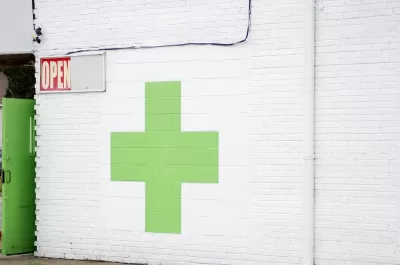Detroit has been fighting some of the provisions of a statewide voter initiative while trying to control an expected proliferation of pot shops around the city.

Katrease Stafford reports:
Only 75 medical marijuana dispensaries will be allowed to legally operate in Detroit, after the city council voted unanimously Tuesday to approve an ordinance that caps the number of facilities citywide and puts more regulations in place on the budding industry.
The ordinance, proposed by council member James Tate, establishes rules for five types of medical marijuana facilities, including locations where medical marijuana could be grown, tested, processed, transported and dispensed to patients with state-approved medical marijuana cards.
According to Stafford, the city crafted its marijuana dispensary legislation to resolve an legal battle sparked by a statewide vote to relax local regulation of marijuana business. The city decided to challenge the law in court, leading to a moratorium on pot shops and a judge striking down one of the voter-approved initiatives in a Wayne County court.
FULL STORY: Detroit just put a limit on the number of pot shops allowed in the city

Maui's Vacation Rental Debate Turns Ugly
Verbal attacks, misinformation campaigns and fistfights plague a high-stakes debate to convert thousands of vacation rentals into long-term housing.

Planetizen Federal Action Tracker
A weekly monitor of how Trump’s orders and actions are impacting planners and planning in America.

San Francisco Suspends Traffic Calming Amidst Record Deaths
Citing “a challenging fiscal landscape,” the city will cease the program on the heels of 42 traffic deaths, including 24 pedestrians.

Defunct Pittsburgh Power Plant to Become Residential Tower
A decommissioned steam heat plant will be redeveloped into almost 100 affordable housing units.

Trump Prompts Restructuring of Transportation Research Board in “Unprecedented Overreach”
The TRB has eliminated more than half of its committees including those focused on climate, equity, and cities.

Amtrak Rolls Out New Orleans to Alabama “Mardi Gras” Train
The new service will operate morning and evening departures between Mobile and New Orleans.
Urban Design for Planners 1: Software Tools
This six-course series explores essential urban design concepts using open source software and equips planners with the tools they need to participate fully in the urban design process.
Planning for Universal Design
Learn the tools for implementing Universal Design in planning regulations.
Heyer Gruel & Associates PA
JM Goldson LLC
Custer County Colorado
City of Camden Redevelopment Agency
City of Astoria
Transportation Research & Education Center (TREC) at Portland State University
Jefferson Parish Government
Camden Redevelopment Agency
City of Claremont



























